'I had to run into a wall and get faced by reality' – Remco Evenepoel and the lessons learned
World champion on loving and hating the Giro d'Italia and the loneliness of the Grand Tour rider
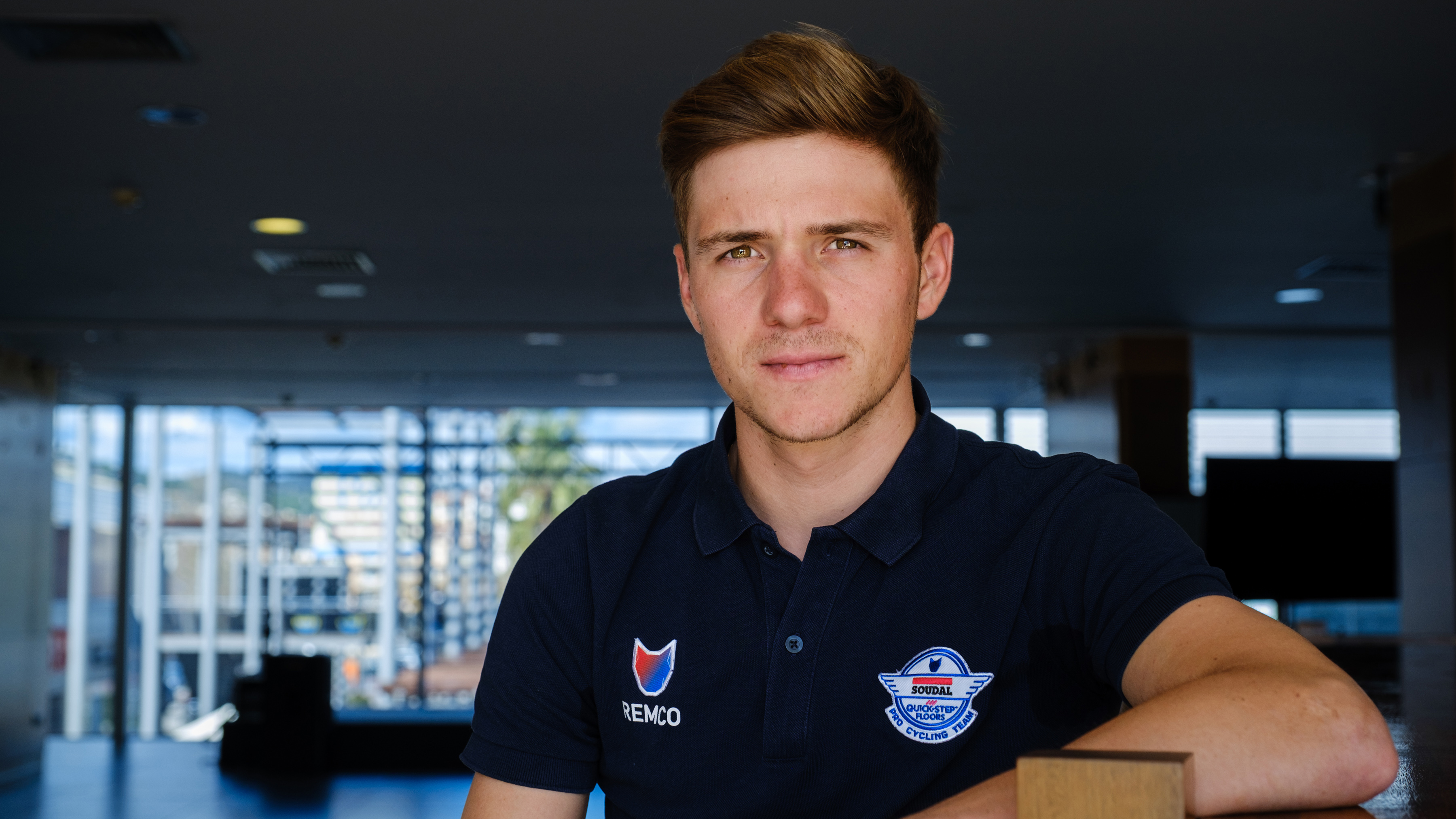

From time to time, even the man with the rainbow on his back flies too close to the sun. It's January, and Remco Evenepoel is sitting alone beneath a canopy atop the Alto Colorado, sipping on a can of Coke and silently cursing the impulsiveness that has just cost him the Vuelta a San Juan.
10km or so from the summit, the Belgian had burst forth from the peloton, turning a mammoth gear that seemed to dare anyone to follow. Nobody did.
As Evenepoel took flight, another solo exhibition seemed inevitable, but high altitude and early-season conditioning can make for a debilitating cocktail for a boy from the lowlands, regardless of his gifts. Within a couple of minutes, the wax on his wings had melted and he was forced to relent, eventually fading to finish over a minute down on winner Miguel Angel López.
Now, Evenepoel stares into the middle distance as Soudal-QuickStep staff bustle about their usual post-race tasks and a group of journalists begins to assemble at a careful distance. They have travelled 12,000km to be here, some with the express task of covering this rider's every move, but nobody dares to disturb this initial, hushed phase of the post-mortem.
One by one, Evenepoel's teammates start to arrive, delivering claps on the shoulder or sympathetic grimaces as they troop past onto the team van. The solidarity seems to shake him from his torpor. He gets to his feet and makes his way towards the reporters to translate his disappointment into words, but his teeth are chattering.
Yves Lampaert has an eye for these details. He pokes his head out of the van and orders his young teammate in out of the cold. It's already early evening at 2,600m above sea level, after all, and the sun is drooping from the cloud-flecked sky. Evenepoel obeys, apologising to the reporters as he climbs aboard.
"I think my greatest flaw is that I can be quite upset for a short amount of time, and I can do or say some ruthless things in that moment"
When he emerges ten minutes later, a transfiguration has taken place. The rainbow jersey has been replaced by a thick hoodie, the shivering has given way to a smile, and the setback has been resized. In Dutch, English and French, Evenepoel now delivers an upbeat mea culpa, freely admitting he had erred in attacking alone, so forcefully and so far from the finish.
Get The Leadout Newsletter
The latest race content, interviews, features, reviews and expert buying guides, direct to your inbox!
"I did a stupid move," Evenepoel says simply. "But in the end, it's better to make a mistake like that now than in the Giro." By the time he finishes talking, he has spun an impetuous error into a self-imposed lesson.
The words of James Joyce's alter-ego Stephen Dedalus spring to mind as the reporters trudge back towards the press tent to file their copy on the world champion's defeat: "A man of genius makes no mistakes. His errors are volitional and are the portals of discovery."
In conversation two days later, Evenepoel revisits the episode, citing it as an example when asked to identify his biggest weakness. "I think my greatest flaw is that I can be quite upset for a short amount of time, and I can do or say some ruthless things in that moment," he says. "But I think I've really made some big steps in that aspect in the last year."
Sometimes, it's easy to forget that the champion cyclist is also a young man of 23, still learning his trade on the bike and still finding his way off it, even as he's running out of worlds to conquer.
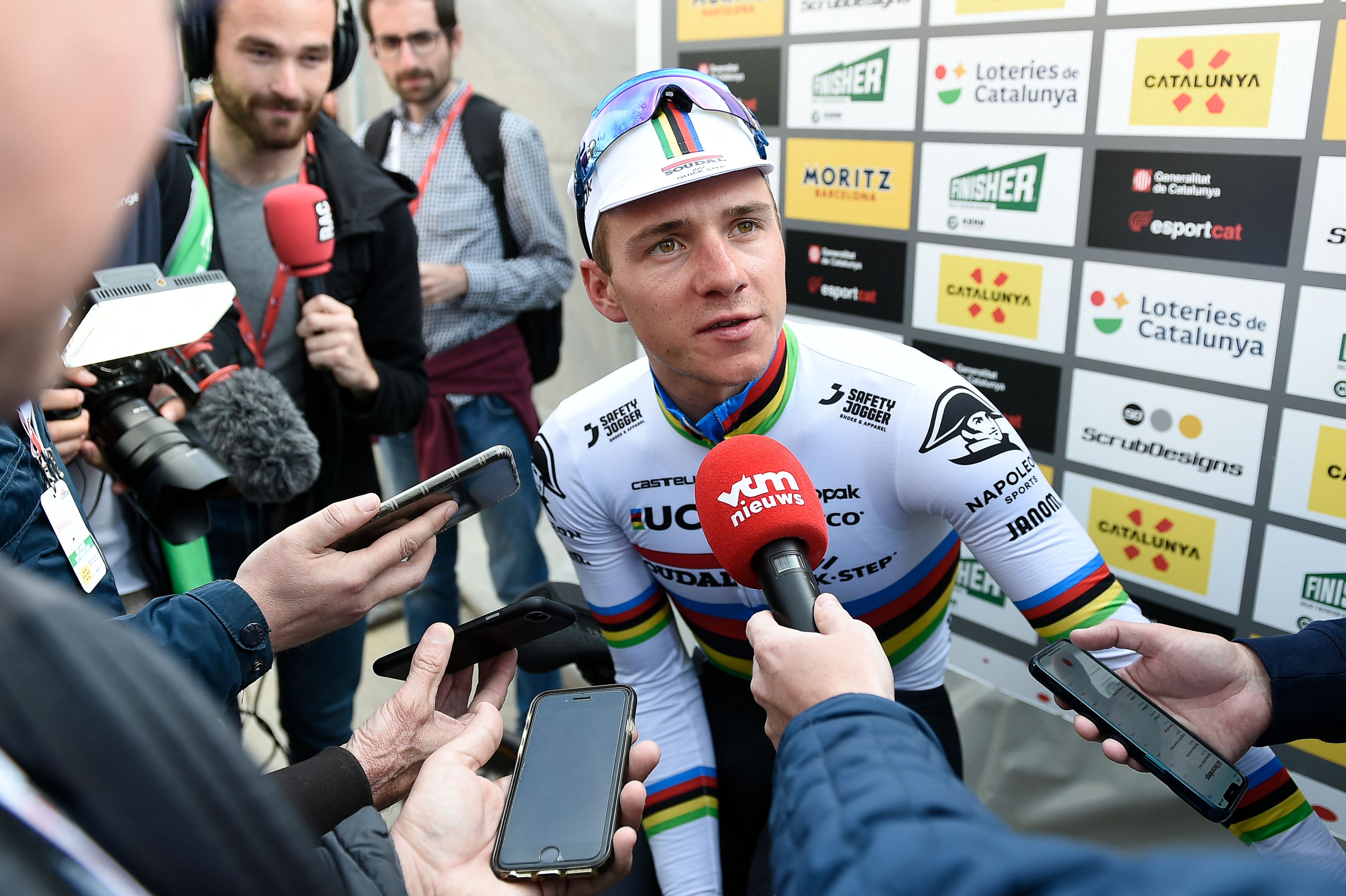
Evenepoel has been dealt harsher lessons in his time than the one served up in Argentina. Perhaps the most humbling one came during his ill-fated Giro d'Italia debut two years ago, but long before then, he had already been condemned to do all his learning in public.
Even Tadej Pogačar enjoyed a few weeks of relative anonymity in the peloton at the very start of his career. There was never any such respite for Evenepoel, whose meteoric talent was picked up by telescopes long before the moment of impact. He has had a dedicated pool of reporters following him to the ends of the earth from the moment he turned professional in 2019, covering every imaginable detail.
He can smile about that when he takes a seat in the hotel lobby opposite the two anglophone journalists present at the Vuelta a San Juan on the morning of the final stage. "The Belgian guys won't be happy when they hear about this, eh," Evenepoel jokes. These days, lengthy audiences with the world champion are granted sparingly, and this will be the last such opportunity this side of his return to the Giro.
It's also a rare chance to take stock. The rolling Remco news cycle tends to follow a breathless rhythm – next race, next rival – but the road he has travelled to this point is worth recalling. Evenepoel's 2022 season was ultimately one of triumph, with victories at Liège-Bastogne-Liège, the Vuelta a España and the World Championships, yet the high-profile defeats along the way were intrinsic parts of the narrative.
Most cyclists grasp very early on that most races will end in defeat, but Evenepoel seemed to breeze past that particular rite of passage. He started winning almost immediately after taking up cycling in the spring of 2017 and then kept on doing so as he burnt through the junior ranks and graduated directly to the WorldTour.
Evenepoel was always a young man in a hurry – witness the hectoring push of a straggler blocking his path at the junior Worlds in 2018 – and that haste benefited him in his first months as a pro, where coming up against obstacles only seemed to heighten his resolve to drill right through them.
"I think 2021 was the year where I learned the most, because there I really had to deal with a lot of setbacks and a lot of disappointments"
"I really had to actually run into a wall and really get faced by the reality," Evenepoel says now of a debut season that started with some fleeting moments of doubt but ended with a preternaturally confident Clásica San Sebastián victory and a European time trial title.
Such impatience would prove more of an impediment, however, by 2021, when Evenepoel was finding his way back after a broken pelvis had kept him out of competition for almost nine months. He still won races that year, of course, but he was also earning himself a reputation for the occasional fit of pique when things didn't go his way.
After the Belgian challenge at that year's Leuven Worlds ended in disappointment, Evenepoel was inevitably depicted as the headstrong enfant terrible whose impertinence had upset the plans of leader Wout van Aert. It was Maertens and Merckx for the social media era. Then as now, some older pros weren't shy in criticising the emerging golden boy. For a few weeks, the gloss dulled.
"I think 2021 was the year where I learned the most, because there I really had to deal with a lot of setbacks and a lot of disappointments," Evenpoel says. "In the moment itself, it was quite difficult to handle, but when the season was done and all the stress was gone, I really could look back on everything properly, and I think that helped me to go into last season."
With each defeat in 2022, certainly, Evenepoel seemed to respond with increasing calm. Irritability at losing the Volta a la Comunitant Valenciana on a steep stretch of gravel in February gave way to simple disappointment at conceding yellow at Itzulia Basque Country two months later. The early collapse of his GC ambitions at the Tour de Suisse, meanwhile, was met with surprising serenity. Something had changed.
"He had to learn. Maybe you can't believe it, but he's still in progress," Soudal-QuickStep manager Patrick Lefevere tells Cyclingnews. "He had to learn how to manage a race, and he also had to learn how to lose."
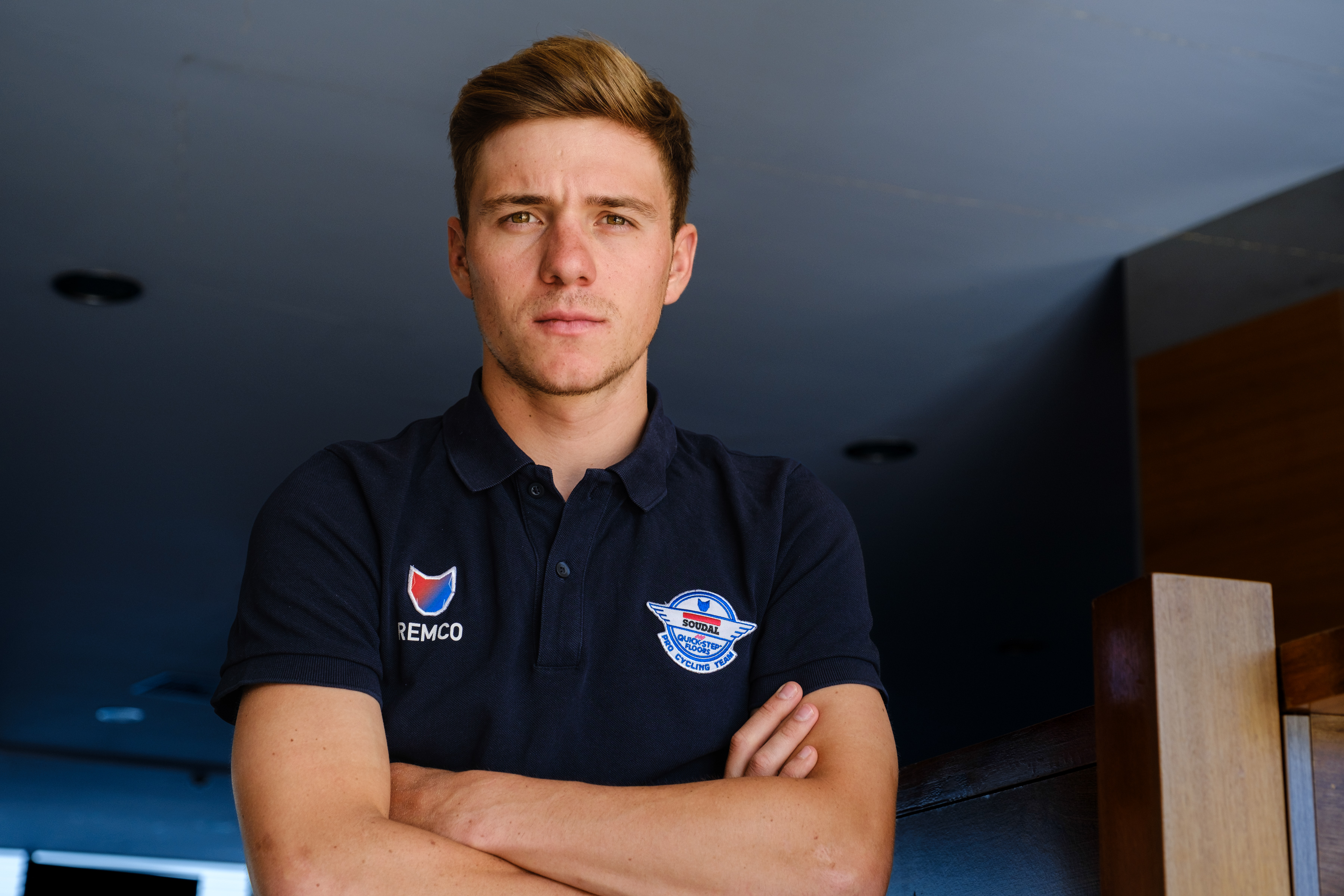
That's not to say, however, that Evenepoel had never known profound sporting disappointment. For a dozen years, between the ages of 4 and 16, his life was carefully arranged around the ardent but fragile hope of becoming a professional footballer. He even moved alone to the Netherlands as a 12-year-old, living with a host family as he switched from Anderlecht to PSV Eindhoven.
The cyclist's qualities are already visible in the portrait of the footballer as a young man painted by La Dernière Heure a few years back. "We never welcomed any boy as motivated as Remco," recalled Debbie Smetsers, who opened her home to him in the Netherlands. "His desire to win was out of the norm, I never saw anything like it," agreed early coach Marc Van Ransbeeck. "His biggest flaw was his lack of explosiveness."
Evenepoel remained on track for a career in football when he returned to Anderlecht a couple of years later, but his second spell at the club would end in disappointment. His hitherto smooth progression stalled, and he began to be left out of the team. A transfer to Mechelen marked the end rather than a fresh beginning. "To be honest, the last few years were the toughest," Evenepoel confessed in 2020. "They broke me a bit mentally."
Sporting dreams are too often chased at an unsustainable human cost, and a great many teenagers cast adrift by football academies flounder when faced with that sudden existential crisis. Evenepoel, however, didn't give himself much time to mourn the end of his footballing life, and despite his academic gifts, he never seemed to give a moment's thought to any kind of career outside of sport either. Instead, he repurposed his previous aspirations and applied them just as wholeheartedly to cycling, the sport of his father Patrick, who raced a pro with Collstrop in the 1990s.
"Sport was always number one in my life, so I don't think I would have had another profession," Evenepoel says, noting that his football heritage left its imprint on his second life as a cyclist. "I dare to take decisions. Once we start to go for it, we don't turn back anymore, and we just really go for it, and I think that's really something I got from my football past."
That rapid transition from football to cycling was also, in hindsight, a testament to his seemingly depthless reservoirs of self-belief. His assurance had only grown by the time he turned professional and casually listed off a checklist of career objectives – "The three Grand Tours. World Championships. The Olympics" – and it remained firmly in place even when he fractured his pelvis in an horrific crash at Il Lombardia in 2020.
"My body wasn’t ready for a three-week performance, so for sure I think we should have been a bit stricter in our decision"
Indeed, Evenepoel's confidence was so overwhelming that it even intoxicated the usually sober judgement of his QuickStep team, who dispatched him to make his Grand Tour debut in his first race back after his eight-month rehabilitation. For the first ten days of the 2021 Giro, Evenepoel even convinced himself and his team that he was in the hunt for overall victory, right up until his challenge collapsed on the gravel roads of Siena wine country.
From there, his Giro became an ordeal, as he shipped heavy losses in the high mountains and crashed in the third week, pulling the plug ahead of stage 18. It was the biggest setback of his career, but in hindsight, he should never have been put in that position in the first place.
"Afterwards it's easy to say it was stupid, but I don't think it was stupid," Lefevere says. "Maybe his own ambition meant that in the end we all started to believe. But it was not really 100% reasonable. And we learned from it. Nobody died."
It's true that within a fortnight of his abandon, Evenepoel was already winning again at the Tour of Belgium, but racing the Giro still felt like a short-term decision that had risked doing far more harm than good. Evenepoel is reluctant to couch that 2021 Giro experience as an entirely negative one even now, however, although he accepts that he probably shouldn't have raced there at all.
"My body wasn't ready for a three-week performance, so for sure I think we should have been a bit stricter in our decision and just said, 'We'll start with something else,'" Evenepoel says. "But I'm also happy that I experienced it, because I think I learned a lot towards my Vuelta. In the moment itself, it wasn't the best decision, I think. But if I look at it now, it's not been a bad decision at all."
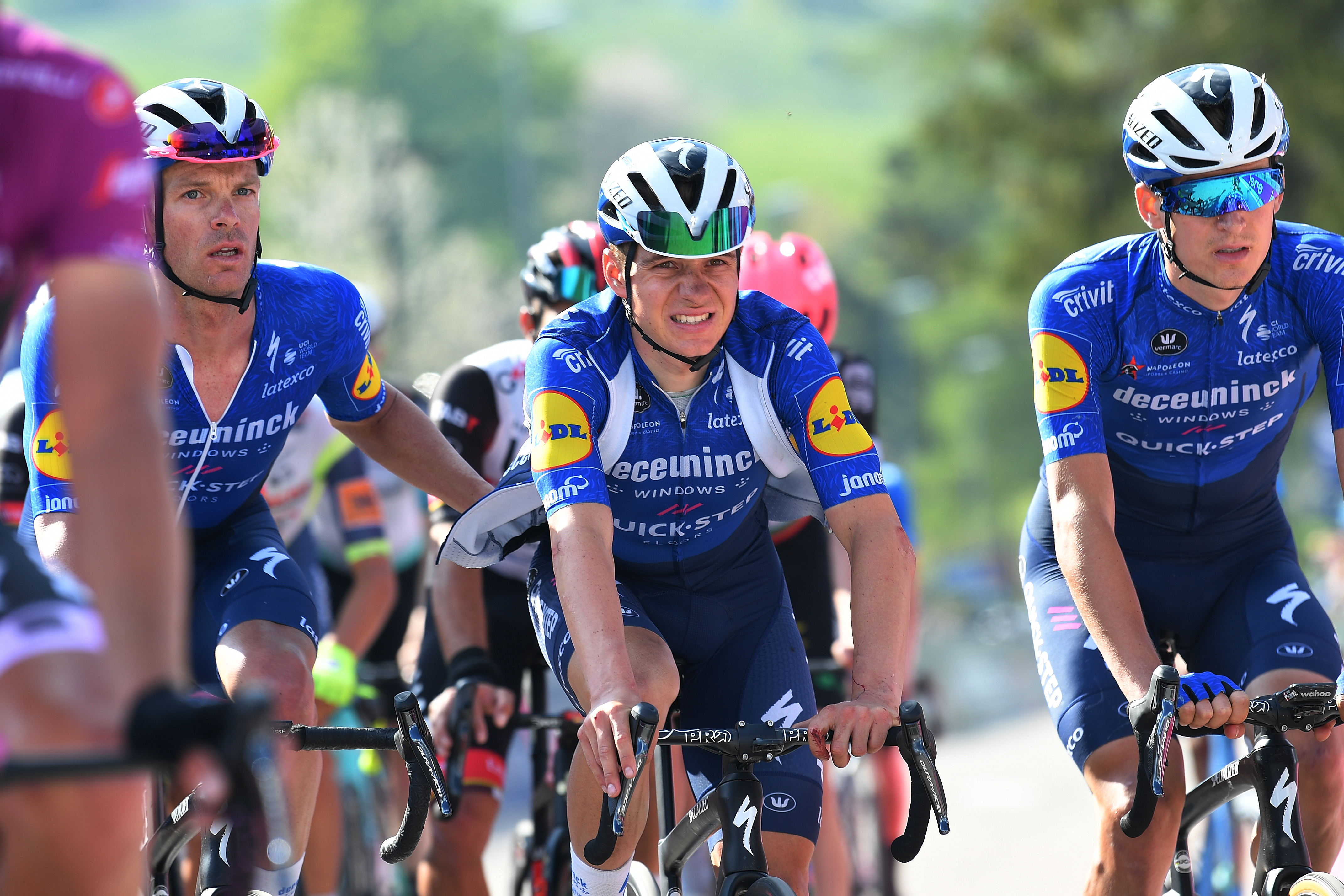
Two years on, Evenepoel's build-up to this Giro could scarcely have been more different – or more serene, even allowing for the fame that saw thousands fill Brussels' Grand Place last October for a civic reception to mark his World Championships and Vuelta victories.
Then again, maybe Evenepoel was uniquely placed to carry the weight of the rainbow jersey. Hailed as the Second Coming of Eddy Merckx before he'd even turned a pedal as a professional, perhaps he had already developed the antibodies to make him all but immune to the distractions of hype.
The decision to decamp to Calpe a couple of years ago surely helped too. Living as public property in Belgium has proved a burden for many burgeoning champions across the generations. Evenepoel's existence on the Costa Blanca with his wife Oumi, by contrast, is streamlined and built around the bike.
In recent years, many riders have found themselves overwhelmed by the ever-increasing sacrifices required by their profession. Some have called time on their careers early as a result, but Evenepoel seems almost to relish it. For all his ease amid the glare of the spotlight, the 23-year-old gives the impression that he enjoys the lonesome, methodical work that leads up to a Grand Tour. At the very least, he accepts it as part of the vocation.
"Preparing for a Grand Tour is the hardest preparation you can have, the most lonely one as well"
"It's three months of all-in and that's what I really like about it," Evenepoel says. "I'm really lucky to have my wife, who is understanding of that completely. We also say to one another it's going to be half a year really quite extreme towards that Grand Tour, and after that, it's a little more up and down: sometimes more relaxed, sometimes more intense.
"I'm really lucky to have people around me who understand it and also like to work like that, because it isn't easy at all. Preparing for a Grand Tour is the hardest preparation you can have, the most lonely one as well. I think that's the hardest aspect in cycling, to prepare for a race where you can also be out after one day. It's very risky and tricky, but it's all worth it when the result is there."
The Argentinian sojourn aside, Evenepoel has already notched up results each time he has road-tested that work this year. "I don't count San Juan, because it was just a cycling holiday," he joked the other week. He sealed February's UAE Tour by applying the lesson from San Juan and calmly limiting his losses to Adam Yates on Jebel Hafeet. In March, he claimed two stage wins and second overall at a high-calibre Volta a Catalunya.
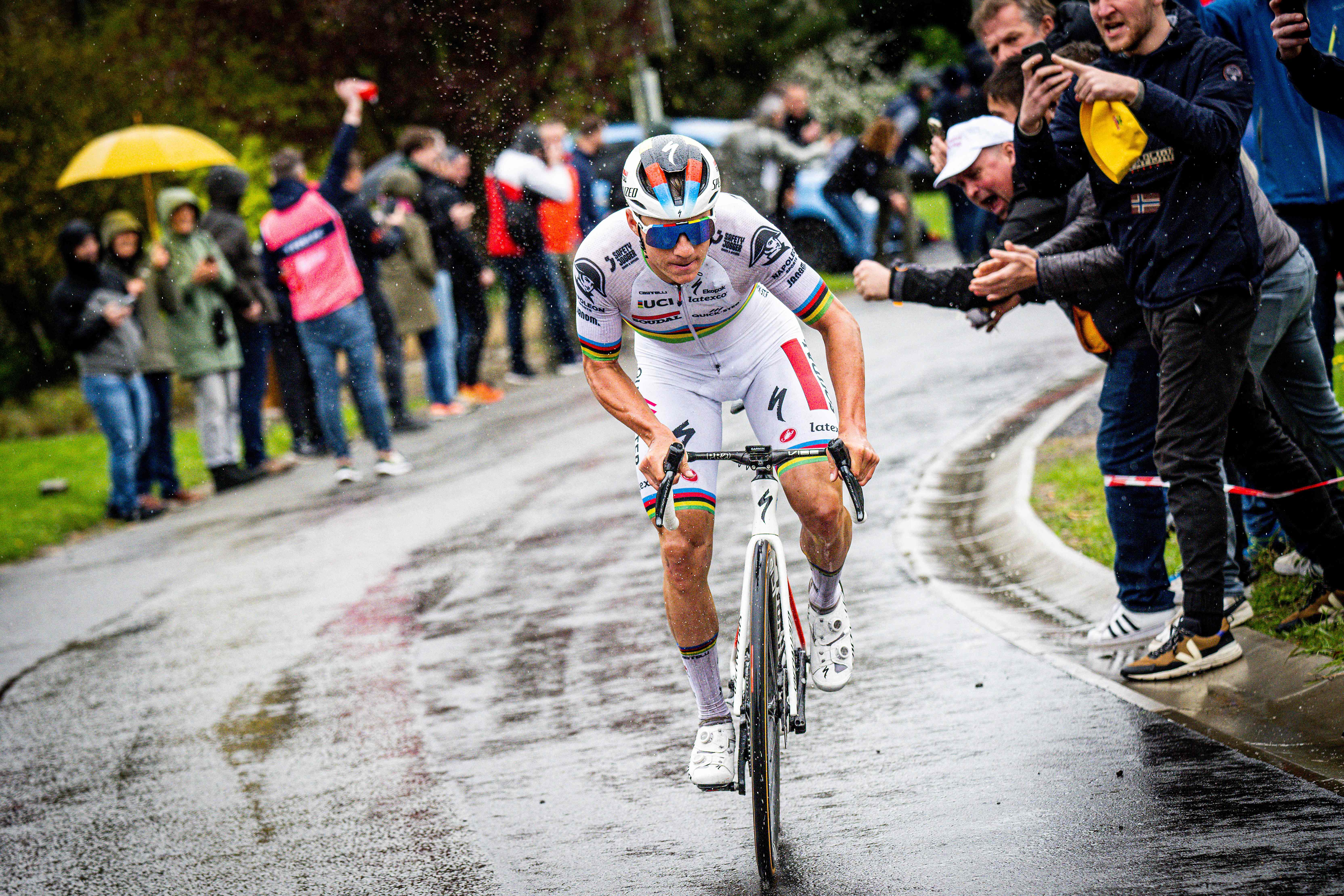
Remco Evenepoel attacks en route to victory in Liège-Bastogne-Liège
His final run-out before the Giro, meanwhile, was a chilling statement of intent, as he soloed to victory at Liège-Bastogne-Liège for the second straight year. Pogačar's early crash meant the much-billed duel never materialised, but Evenepoel's lone effort from the top of La Redoute was still a reminder that the tag of the era's outstanding rider is perhaps not quite settled.
Another duel, of course, has been Evenepoel's focus for most of the Spring, and the nip-tuck battle with Primož Roglič across all seven days of the Volta a Catalunya strongly hinted at what might follow in the Giro.
Evenepoel didn't exactly hide his exasperation when the Slovenian marked him tightly on the penultimate stage, but the joust ended in handshakes and smiles.
Just as well: he was unable to shake Roglič's company even when he retired to the seclusion of Mount Teide afterwards for the most important of his pre-Giro altitude camps last month. On arrival at the Parador Hotel, he found Jumbo-Visma had checked in at the same time.
Each day, Evenepoel toiled up and down the volcano steeling himself for his contest against Roglič in May. Each evening, the two Giro d'Italia favourites found themselves sitting uneasily at opposite ends of the same cramped dining room, united by their shared sacrifice but divided by their common goal. It was as if Muhammad Ali had been compelled to split his Deer Lake training camp with Joe Frazier before the Thrilla in Manilla.
"I think I had one or two chats with him of five minutes. Nothing special to declare actually, just nice chats between two cyclists," Evenepoel would say afterwards.
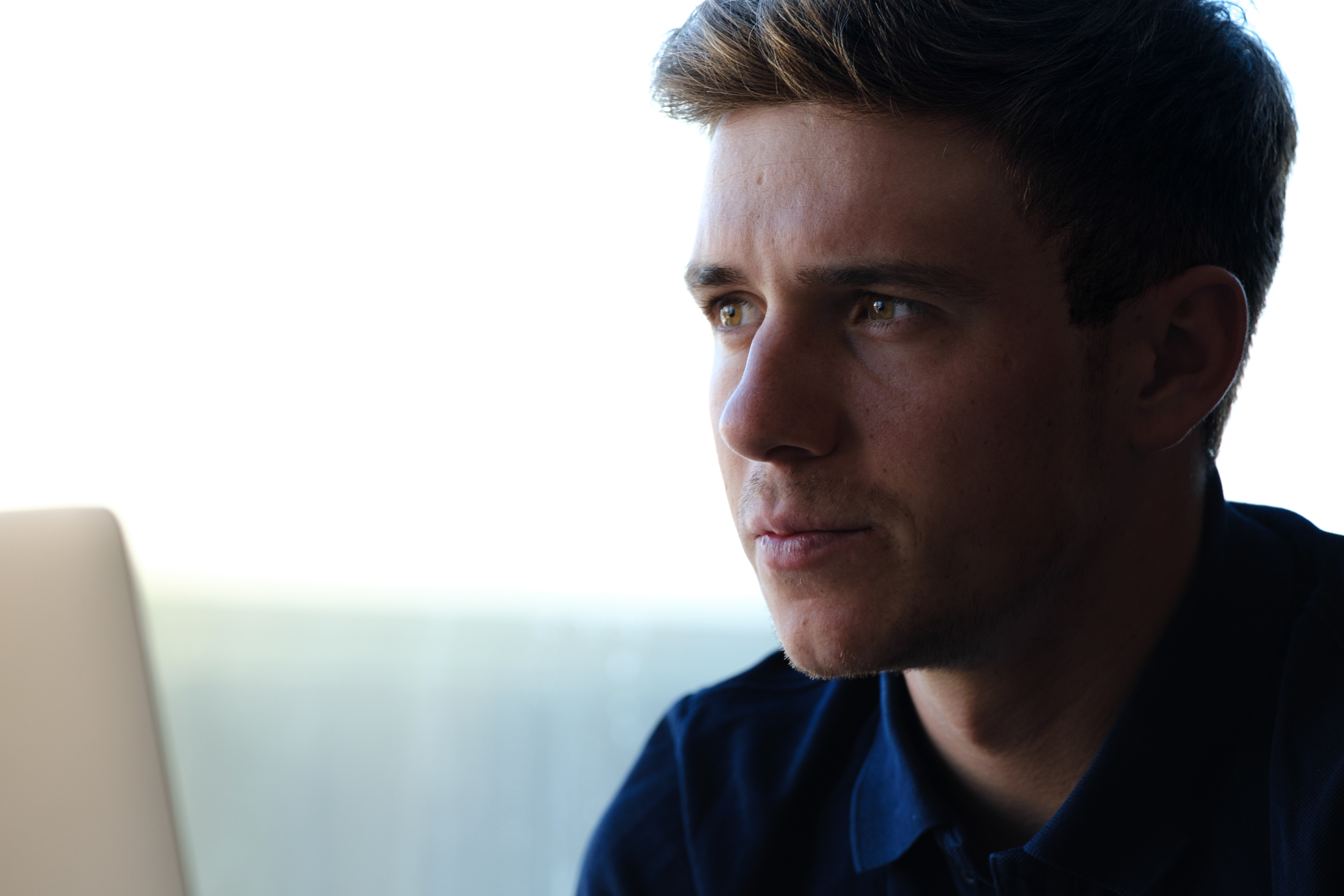
Evenepoel won’t take on Roglič and Jumbo alone, mind. Soudal signed on as title sponsor of Lefevere’s team with the express intention of getting into the Evenepoel business, and over the past two years, the roster has been duly shaped around his Grand Tour aspirations.
In Italy, men like Ilan Van Wilder and Jan Hirt will form Evenepoel’s guard, and his role as their leader seems to inspire rather than inhibit him. It’s like he’s back on the football field, wearing the captain’s armband and making decisions.
“When I give the guys some calm feelings and I show them that I’m not stressed about a certain situation, they will also stay calm,” Evenepoel says. “When you’re on a good level, the others will also be on a good level, they will also give everything they have. That’s also what I really enjoy about being a team leader: taking the group with me towards another level.”
"You can love it, but you can also hate it the day after. That’s what makes the Giro very special"
Two years ago, when he lost 24 minutes on the abridged tappone over the Passo Giau, Evenepoel found his own ability to reach the required level being called into question. His truncated build-up offered some mitigation, but the doubts about his Grand Tour future persisted, even when his performances early in 2022 began to suggest a very striking improvement in his power-to-weight ratio.
Seizing the red jersey early at the Vuelta and then carrying it all the way to Madrid since confirmed Evenepoel’s three-week bona fides, but it’s hard to shake the feeling that he enters this Giro with a point to prove, or at the very least, a score to settle.
“No, it’s not really a revenge, but it’s also not a race like any other race, of course,” Evenepoel says. “I didn’t finish the race, so maybe that’s more in my head than taking revenge on the result or something.”
Regardless of the weight of past baggage, this Giro is heavy in and of itself. Mauro Vegni may have rolled out a 70km-long welcome mat of time trialling to ensure Evenepoel opted against making his Tour de France debut in 2023, but the rigours of this year’s final week are extreme even by the merciless standards of this race.
As well pushing against the tightening contours in the Alps, Evenepoel will race with the hand of history on his shoulder. Stage 19 finishes on the Tre Cime di Lavaredo, where Merckx, rainbow jersey on his back, forged his first Giro victory in the snow in 1968. Past and present bleed into one another in the Giro’s holy places. The script seems almost pre-written. Now it’s up to Evenepoel to hit his lines.
“It’s another Grand Tour, it’s one of the three, but it’s of course a very special country to race in. I don’t know… it’s always a bit strange,” Evenepoel says. “The parcours can change from one day to the other, you can have really everything, you have 30 degrees one day then the day after you can have snow and freezing temperatures. And there are a lot of emotions beside it as well, because Italians are very emotional.
“I think overall, it’s maybe the most beautiful race there is in the season, but it can be also the most cruel one. You can love it, but you can also hate it the day after. That’s what makes the Giro very special in my eyes."
Mistake or not, the reality of his previous Giro experience should stand him in good stead now.
Thank you for your Cyclingnews subscription. We use our subscription fees to be able to keep producing all our usual great content as well as more premium pieces like this one. Find out more here.

Barry Ryan was Head of Features at Cyclingnews. He has covered professional cycling since 2010, reporting from the Tour de France, Giro d’Italia and events from Argentina to Japan. His writing has appeared in The Independent, Procycling and Cycling Plus. He is the author of The Ascent: Sean Kelly, Stephen Roche and the Rise of Irish Cycling’s Golden Generation, published by Gill Books.